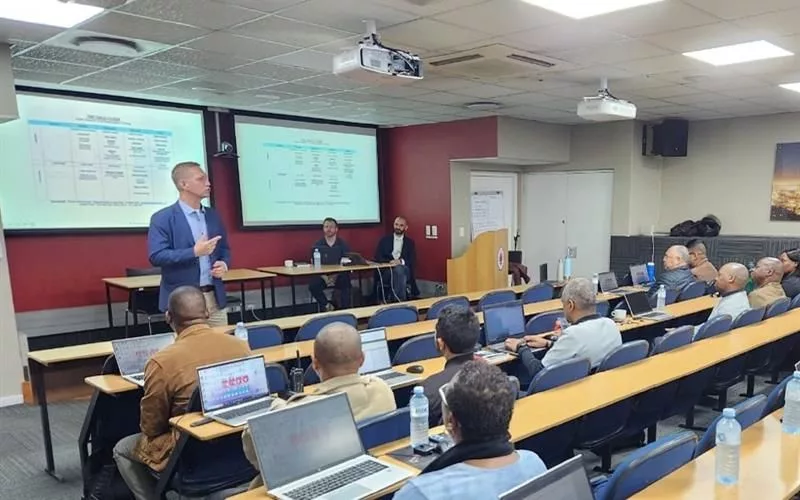The Safety and Security Directorate of the city recognizes the importance of integrating cyber forensics into their defensive strategy due to the increasing rate of digital offenses. To achieve this objective, they recently organized a transnational training session on cyber forensics led by professionals from France and Australia, focusing on digital aspects of crime scenes and handling digital proof. The Directorate plans to incorporate cyber forensics into their training college’s curriculum to prepare their personnel to tackle modern criminal activities effectively.
The Vital Need for Cyber Forensics in City Safety and Security
The escalating rate of digital offenses has made city’s Safety and Security Directorate realize the critical requirement of integrating cyber forensics into their defensive strategy. Recently, the Directorate made notable progress toward achieving this objective by organizing a transnational training session on cyber forensics.
The Vital Need for Cyber Forensics in City Safety and Security
In a time when technology serves as a tool for both virtuous champions and nefarious wrongdoers, it is essential for those tasked with the protection and safety of the city to be well-versed in its workings. The escalating rate of digital offenses has made city’s Safety and Security Directorate realize the critical requirement of integrating cyber forensics into their defensive strategy.
Recently, the Directorate made notable progress toward achieving this objective by organizing a transnational training session on cyber forensics. This initiative brought together seasoned professionals from France and Australia, who have distinguished themselves in the field. This follows in the footsteps of a similar training session conducted last year that focused on crimes such as kidnapping and extortion. These steps clearly reflect the Directorate’s dedication to keeping up-to-date with modern criminal activities and preparing its personnel to tackle them effectively.
Leading the Charge in Cyber Forensics Training
The training initiative was led by Warrant Officer Benoit Magne, a Cybercrime Investigator from the French National Police, and Detective Sergeant Jonathon Coats of the Australian Federal Police, who serves as a Liaison Officer for Cyber matters in Sub-Saharan Africa. The program aimed to familiarize the Directorate staff not only with the fundamental concepts of cyber forensics but also with the subtleties of its application in tangible crime scenarios.
The reasoning behind this initiative is straightforward yet significant. Alderman JP Smith, the Mayoral Committee Member for Safety and Security, pointed out, “Our law enforcement teams are frequently the first to arrive at a crime scene. With the growing usage of smart devices in criminal activities, it is crucial to have the expertise to secure potential digital evidence and devices, preserving the credibility of the evidence chain and understanding what to search for.”
The Course: A Comprehensive Overview of Digital Forensics
The course was designed to provide the staff with skills to proficiently navigate the often overlooked but critical digital aspects of crime scenes. From identifying electronic devices or parts at crime scenes to securing digital proof, the course presented a thorough overview of the process. It also acquainted the staff with the best procedures for handling digital proof, such as labeling ports and cables attached to devices, checking for fingerprints on devices and various media, and managing non-electronic components like photographs and printouts.
Furthermore, the staff was trained in the intricate task of finding potential hints about device passwords from a suspect’s environment. The focus wasn’t just on transferring knowledge but also on instilling a new approach, a fresh vision for comprehending and examining crime scenes.
“The training has been gripping,” said Alderman Smith, expressing his satisfaction with the program. “I am delighted that we’ve been able to involve some of our staff members in it.” He also expressed his gratitude to the trainers for their priceless contribution.
Restructuring the Future of City Safety and Security
For the city’s Safety and Security Directorate, this training marks just the first step. Smith revealed plans to incorporate cyber forensics into the curriculum at the Directorate Training College, ensuring that the city’s forthcoming line of defense is ready to face the challenges of the digital world fearlessly.
The rapidly evolving global landscape necessitates equally adaptable defenders. With this cyber forensics training initiative, the city’s Safety and Security Directorate is certainly proving itself to be well-prepared for the digital age.
1. Why is cyber forensics important in city safety and security?
The escalating rate of digital offenses has made the city’s Safety and Security Directorate realize the critical requirement of integrating cyber forensics into their defensive strategy.
2. What did the transnational training session on cyber forensics entail?
The training initiative brought together seasoned professionals from France and Australia, who have distinguished themselves in the field. The program aimed to familiarize the Directorate staff with the fundamental concepts of cyber forensics and its application in tangible crime scenarios.
3. Who led the cyber forensics training initiative?
The training initiative was led by Warrant Officer Benoit Magne, a Cybercrime Investigator from the French National Police, and Detective Sergeant Jonathon Coats of the Australian Federal Police.
4. What topics were covered in the course on digital forensics?
The course covered a comprehensive overview of digital forensics, including identifying electronic devices or parts at crime scenes, securing digital proof, handling digital proof, finding potential hints about device passwords, and instilling a new approach to comprehending and examining crime scenes.
5. What are the future plans of the Safety and Security Directorate regarding cyber forensics?
The Directorate plans to incorporate cyber forensics into their training college’s curriculum to prepare their personnel to tackle modern criminal activities effectively.
6. Why is it crucial to have expertise in securing potential digital evidence and devices in criminal activities?
With the growing usage of smart devices in criminal activities, it is crucial to have the expertise to secure potential digital evidence and devices, preserving the credibility of the evidence chain and understanding what to search for.








